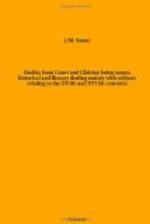“From Richmond, the 1st Dec. 1578.”
Further relief was extended to him, as appears by another letter from the Council, allowing him to remain in his house till Lady Day, when he was to appear and answer to the charge of papistry, “unless in the meantime God shall turn his heart otherwise.”
Slight as were the penalties inflicted on Sir Henry when compared with those which his brothers were called upon to endure, troubles were not wanting to him in his old age He was not only a prisoner within five miles of his own house, subject to heavy fines for the privilege of absenting himself from the new service, but he was liable at any time to have his house searched* for priests and church-stuff, to have his household dismissed, and to be called on to endure religious conferences. He was, moreover, in feeble health, and to complete his misfortunes, his devoted wife was taken from him. On this occasion a letter from eight members of the Privy Council was delivered to him:—
* For “the search at Mr. Bedingfeld’s house,” and the anonymous letter which led to it, see Calendar of State Payers, Dom. Eliz. 1581-1590, p. 648, No. 76. A copy of a letter found directed to Cromwell accused Sir Henry of treasonable designs in conjunction with papists and recusants. “Diligent searches have been made at the house of Mr. Henry Bedingfelde, but nothing suspicious found.”
“To our loving friend, Sir Henry Bedingfeld.
“We commend us unto you. Whereas about three years past, when you were sent for to have appeared before us, touching your disobedience in Religion, we were then moved in consideration of your sickness and infirmity, and the humble suit of Henry Seckford, your son, you being then in the way hitherward, to licence you to return back unto your own house, whither you were before committed, there to remain until further order should be taken with you. And whereas at this time your son has made like humble suit unto us that you may be suffered to remove from your said house unto St. Mary’s, Wignollen, in Marshland, a house of your daughter Seckford, there to remain for a season until you may pass over the grief and remembrance of the lady, your wife, lately deceased, these are in that respect to give you licence so to do. And therefore you may, at your liking remove to that place, continuing yourself in like degree of restraints as you did in your own house, and these shall be your warrant in that behalf. So fare you well.
“From the Court at Whitehall, 28 of Dec. 1581. Your loving friends."*
* Exactly the same treatment was endured by his descendant Sir Henry Arundell Bedingfeld in 1713. The following instance affords a proof of the extraordinary persistence with which the penal laws against Catholics were enforced 110 years after Elizabeth’s death.
“Licence from the justices, August 10, 1713, for Sir Henry Bedingfeld to go from home for a month.




